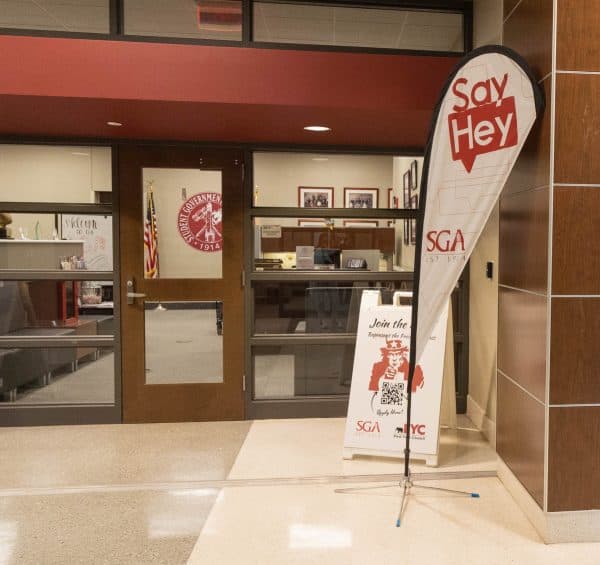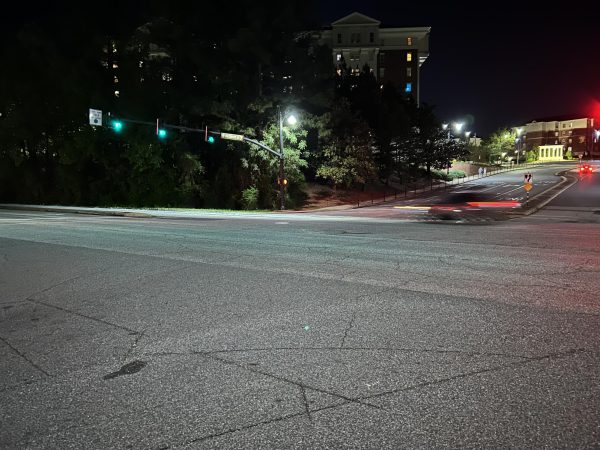Social media creates new avenues for cyberstalking
March 25, 2019
Katy Peters, a freshman majoring in accounting, said she always turns off location services and keeps her accounts private to prevent cyberstalking.
“I think cyberstalking can be a big issue if you allow it to be,” Peters said. “Social media is so prevalent nowadays, and there are so many people who post their every move. It is extremely easy to find out where someone is at every moment in their life. I think that is extremely unsafe to have your location readily available and for people to know your every move.”
Beth Howard, UA Title IX coordinator, said while the number of stalking cases reported has remained relatively consistent over the years, online stalking is becoming a more prevalent issue with the rise of technology and social media use.
Howard said apps like “Find My Friends” or checking in at various locations on social media allows others to easily locate someone whenever they want.
“One of the things that we see more of is the use of social media for stalking,” Howard said. “You might share your location with friends, but people who want to stalk you are going to use those avenues, and it might be putting you at a greater risk of danger.”
According to a report by the Data and Society Research Institute at the Center for Innovative Public Health Research, 47 percent of internet users have experienced online harassment or abuse. In addition, the report found that while men and women are equally likely to face harassment online, “women experience a wider variety of online abuse, including more serious violations.”
Howard said online harassment and cyberstalking are still a crime, but they are different than in-person stalking and must be viewed differently as a result.
“Sometimes things are harassment, which is still a crime, but different than stalking,” Howard said. “We look at the different ways they’re trying to contact you or get information from you. If it’s multiple incidents or multiple ways, maybe they’re following you on social media or constantly sending you messages, then we may be able to look deeper into the situation.”
Howard said victims of online harassment and cyberstalking have various options and avenues of how to deal with their situation, but she said it is important to make a report and document the harassment as it goes on.
“If you get help from the Title IX Office, you don’t necessarily have to file a report, but it’s always good to have that documented in as many ways as you can,” Howard said. “Either way we can file a no-contact order, and a lot of times that will end the conduct.”
Lt. Dennis McMillian, chief investigator at UAPD, created the Joint Electronic Crimes Task Force (JECTF) in 2014 with a grant from the Alabama Department of Economic and Community Affairs (ADECA).
The JECTF lab aids local and national law enforcement officials by collecting and processing digital evidence for use in cybercrime investigations. McMillian said keeping an updated and consistent record of all instances of online harassment or instances of cyberstalking is an essential part of prosecuting someone for the crime.
“Without documentation and evidence, there is no way for us to get a warrant,” McMillian said. “Without a warrant, we are unable to carry out an investigation and charge the perpetrator.”
McMillian said the three most important steps to take if someone feels like he or she is being cyberstalked is to preserve all evidence, both online communication and any physical encounters, report incidents and lock down all social media accounts.
McMillian said UAPD handles about three or four cybercrime cases a semester, but most cases go unreported.
“A lot of people are afraid to report incidents because they’re afraid of getting in trouble if they were drinking underage or something like that, but your safety and ensuring the harassment stops is more important in this circumstance,” McMillian said.
While Howard said she doesn’t want victims of cyberstalking to feel like they have to change how they live their lives, it is important to keep track of who is viewing the content people post.
“If someone is doing something to you that they shouldn’t be, we don’t want you to feel like you’re the one who needs to change,” Howard said. “However, we generally advise that if you’ve got things public, make them private and be aware of your resources and options when handling the situation.”











